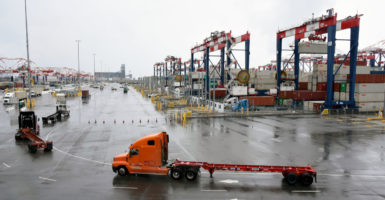The World Trade Organization recently reported that half of its member countries currently imposing coronavirus pandemic-related export-control restrictions were not reporting those controls.
The report highlighted the lack of transparency and long-term risks that shortsighted restrictions pose to trade flows and global supply chains.
In particular, the World Trade Organization report noted, “80 countries and separate customs territories have introduced export prohibitions or restrictions as a result of the COVID-19 pandemic, including 46 WTO members (72 if [European Union] member states are counted individually) and eight non-WTO members.”
>>> When can America reopen? The National Coronavirus Recovery Commission, a project of The Heritage Foundation, is gathering America’s top thinkers together to figure that out. Learn more here.
Over the past decades, international trade has fueled competition, innovation, and economies of scale, empowering producers and consumers all over the world with more choices.
Indeed, the freedom to trade is the foundation of economic progress, and the expansion of global markets has proven to be a powerful engine for growth and a key factor in the worldwide fight against poverty.
Not surprisingly, trade freedom goes hand in hand with overall prosperity and human development, as documented by The Heritage Foundation’s annual Index of Economic Freedom and other studies.
People in countries with higher degrees of trade freedom tend to enjoy greater food security, healthier environments, and enhanced political stability, as well as social progress.
Governments that curtail trade freedom in order to insulate companies from international competition run the risk of lowering productivity and ultimately reducing both producers and citizens as a whole to second-class economic status.
In a highly complex global economic environment, open trade is a constantly evolving phenomenon and process. The temptation to seek short-term advantages through protectionist measures abounds and has been increasing.
Particularly in the context of the current coronavirus pandemic, defending and advancing trade freedom is more critical than ever.
To that end, the recently released Heritage Foundation report “Saving Lives and Livelihoods: Recommendations for Recovery” by the National Coronavirus Recovery Commission, underscored the point:
America must leverage its natural strengths of freedom and free enterprise to reinvigorate economic activity at home and abroad. The U.S. should intentionally be proactive in promoting ‘free trade’ internationally.
Protectionist barriers should be reduced, with the caveats that trade should be economically fair over time, should protect intellectual property, and should be inherently safe.
To paraphrase former President Ronald Reagan: The goal of free trade should be to unite people around the world in a bond of mutually beneficial exchange.
The freedom to trade must be guarded and enhanced to spark constructive free-market competition and ensure private sector growth for the post-pandemic global economic recovery.































